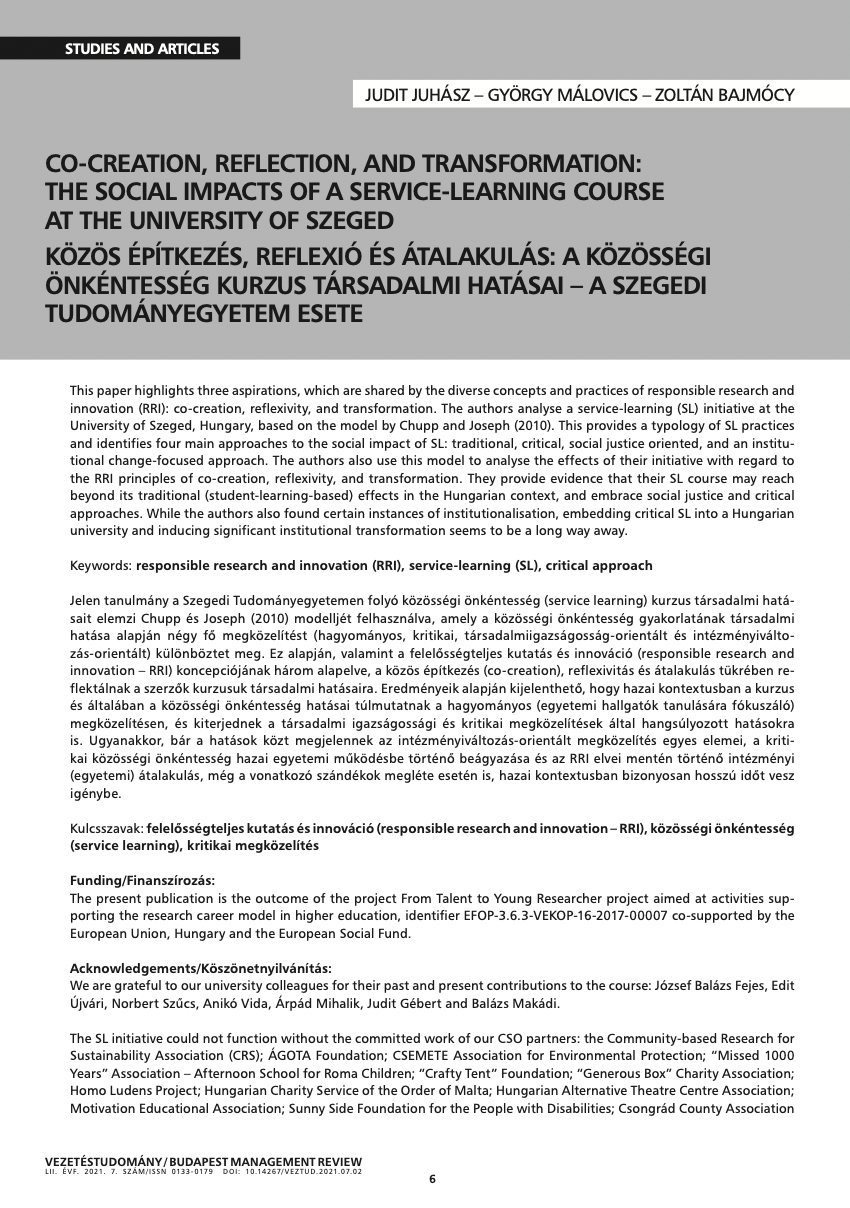Co-Creation, Reflection, and Transformation
The Social Impact of a Service-Learning Course at the University of Szeged
DOI:
https://doi.org/10.14267/VEZTUD.2021.07.02Keywords:
responsible research and innovation (RRI), service-learning (SL), critical approachAbstract
This paper highlights three aspirations, which are shared by the diverse concepts and practices of responsible research and innovation (RRI): co-creation, reflexivity, and transformation. The authors analyse a service-learning (SL) initiative at the University of Szeged, Hungary, based on the model by Chupp and Joseph (2010). This provides a typology of SL practices and identifies four main approaches to the social impact of SL: traditional, critical, social justice oriented, and institutional change-focused approach. The authors also use this model to analyse the effects of their initiative with regard to the RRI principles of co-creation, reflexivity, and transformation. They provide evidence that their SL course may reach beyond its traditional (student-learning-based) effects in the Hungarian context, and embrace social justice and critical approaches. While the authors also found certain instances of institutionalisation, embedding critical SL into a Hungarian university and inducing significant institutional transformation seems to be a long way away.
Downloads
References
Astin, A. W., & Vogelgesang, L. J., & Ikeda, E. K., & Yee, J. A. (2000). How service learning affects students. Los Angeles: Higher Education Research Institute, UCLA Graduate School of Education.
Bajmócy, Z., & Pataki, G. (2019). Responsible research and innovation and the challenge of co-creation. In Arno Bammé & Günter Getzinger (eds.), Yearbook 2018 of the Institute for Advanced Studies on Science, Technology and Society (pp. 1-15). München; Wien: Profil Verlag.
Bajmócy, Z., Gébert, J., Málovics, G., & Pataki, G. (2019). Miről szól(hatna) a felelősségteljes kutatás és innováció? Közgazdasági Szemle, 66(3), 286-304. https://doi.org/10.18414/ksz.2019.3.286
Ballard, S. M., & Elmore, B. (2009). A labor of love: Constructing a service-learning syllabus. Journal of Effective Teaching, 9(3), 70-76.
Brinkmann, S., & Kvale, S. (2015). InterViews. Learning the craft of qualitative research interviewing. Thousand Oaks: Sage Publications.
Butin, D. W. (2003). Of what use is it? Multiple conceptualizations of service learning within education. Teachers College Record, 105(9), 1674-1692. https://doi.org/10.1046/j.1467-9620.2003.00305.x
Butin, D. W. (2006a). Special issue: Introduction future directions for service learning in higher education. International Journal of Teaching and Learning in Higher Education, 18(1), 1–4. https://scholarworks.merrimack.edu/soe_facpub/16
Butin, D. W. (2006b). The limits of service-learning in higher education. The Review of Higher Education, 29(4), 473-498. https://doi.org/10.1353/rhe.2006.0025
Chupp, M. G., & Joseph, M. L. (2010). Getting the most out of service learning: Maximizing student, university and community impact. Journal of Community Practice, 18(2-3), 190-212. https://doi.org/10.1080/10705422.2010.487045
Furco, A. (1996). Service-Learning: A Balanced Approach to Experiential Education. In Furco, A. (ed.), Expanding Boundaries: Serving and Learning (pp. 2-6). Washington, DC: Corporation for National Service. https://www.shsu.edu/academics/cce/documents/Service_Learning_Balanced_Approach_To_Experimental_Education.pdf
European Commission (EC) (2012). Responsible research and innovation. Europe’s ability to respond to societal challenges. Bruxelles: European Commission.
Edquist, C. (2013). Systems of innovation: technologies, institutions and organizations. London: Routledge.
Goddard, J. (2017). The strategic positioning of cities in 21st century challenges: the civic university and the city. In Grau, F.X. (Ed.), Higher education in the world 6. Towards a socially responsible university: balancing the global with the local (pp.115-127). Girona: Global University Network for Innovation.
Johnson, D. B. (2000). Faculty guide to service-learning. Washington, DC: Community service center Mary Graydon Center, American University. https://www.american.edu/ocl/volunteer/upload/faculty-guide.pdf
Kezar, A., & Rhoads, R. A. (2001). The dynamic tensions of service learning in higher education. Journal of Higher Education, 72, 148-171. https://doi.org/10.2307/2649320
Lundvall, B. A. (1988). Innovation as an interactive process: From user-producer interaction to national systems of innovation. In G. Dosi, C. Freeman, R. Nelson, G. Silverberg, & L. Soete (eds.), Technical change and economic theory (pp. 349-369). London: Pinter Publishers.
Marullo, S., & Edwards, B. (2000). From charity to justice: The potential of university-community collaboration for social change. American Behavioral Scientist, 43(5), 895-912. https://doi.org/10.1177/00027640021955540
Nelson, R. R. (Ed.). (1993). National innovation systems: A comparative analysis. Oxford: Oxford University Press on Demand.
Owen, R., Macnaghten, P., & Stilgoe, J. (2012). Responsible research and innovation: From science in society to science for society, with society. Science and Public Policy, 39(6), 751-760. https://doi.org/10.1093/scipol/scs093
De Saille, S. (2015). Innovating innovation policy: The emergence of ‘Responsible Research and Innovation’. Journal of Responsible Innovation, 2(2), 152-168. https://doi.org/10.1080/23299460.2015.1045280
Stilgoe, J., Owen, R., & Macnaghten, P. (2013). Developing a framework for responsible innovation. Research Policy, 42(9), 1568-1580. https://doi.org/10.1016/j.respol.2013.05.008

Downloads
Published
How to Cite
Issue
Section
License
Copyright (c) 2021 Vezetéstudomány / Budapest Management Review

This work is licensed under a Creative Commons Attribution 4.0 International License.
Authors assign copyright to Vezetéstudomány / Budapest Management Review. Authors are responsible for permission to reproduce copyright material from other sources.

